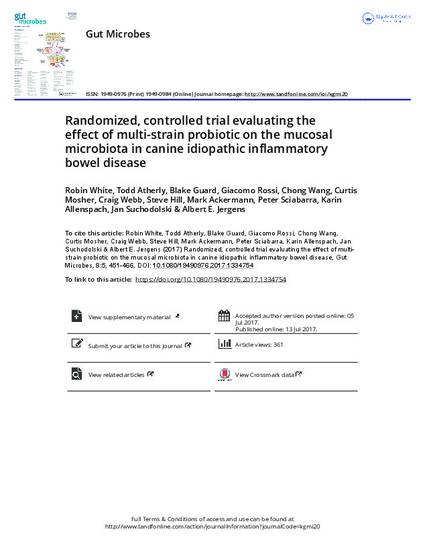
The intestinal microbiota is increasingly linked to the pathogenesis of idiopathic inflammatory bowel disease (IBD) in dogs. While studies have reported alterations in fecal (luminal) microbial populations, only limited information is available about the mucosal microbiota of IBD dogs at diagnosis and following medical therapy. Our aim was to characterize the mucosal microbiota and determine the clinical, microbiological, and mucosal homeostatic effects of probiotic treatment in dogs with IBD. Thirty four IBD dogs were randomized to receive standard therapy (ST = diet + prednisone) with or without probiotic. Tissue sections from endoscopic biopsies were evaluated by fluorescence in situ hybridization (FISH) on a quantifiable basis. Disease activity and changes in mucosal microbiota and tight junction protein (TJP) expression were assessed before and after 8 weeks of IBD therapy. ST and ST/probiotic therapy modulated the number of mucosal bacteria of IBD dogs in a similar fashion. Both treatments increased the numbers of total bacteria and individual species residing within adherent mucus, with ST therapy increasing Bifidobacterium spp. and ST/probiotic therapy increasing Lactobacillus spp (P < 0.05 for both), respectively. Both treatments were associated with rapid clinical remission but not improvement in histopathologic inflammation. Probiotic therapy was associated with upregulated (P < 0.05) expression of TJPs E-cadherin, occludin, and zonulin versus ST. The probiotic effect on mucosal bacteria is similar to that of IBD dogs receiving ST. IBD dogs fed probiotic had increased TJP expression suggesting that probiotic may have beneficial effects on mucosal homeostasis.
Available at: http://works.bepress.com/chong-wang/97/

This aricle is published as White, Robin, Todd Atherly, Blake Guard, Giacomo Rossi, Chong Wang, Curtis Mosher, Craig Webb et al. "Randomized, controlled trial evaluating the effect of multi-strain probiotic on the mucosal microbiota in canine idiopathic inflammatory bowel disease." Gut microbes 8, no. 5 (2017): 451-466. doi: 10.1080/19490976.2017.1334754.